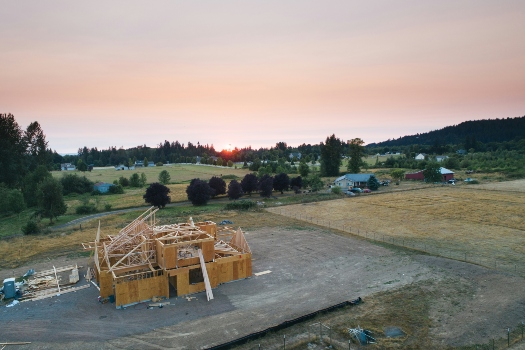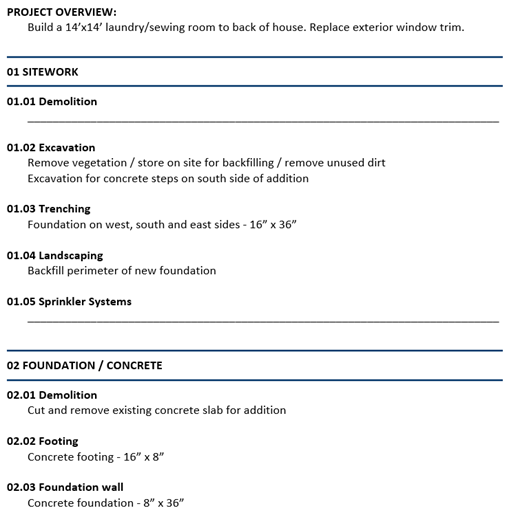It’s Like Quality Construction, It Sets You Apart as a Professional
As Gene is driving to his weekly Saturday training with John, he remembers how hard it was in the beginning to convince himself to take the time to learn this system and how glad he is that he did. He thinks back over what he’s learned during the past several weeks:
- Digging down to figure out why he was doing construction and the importance of that clarity.
- Common bid mistakes that contractors make and how to avoid them.
- The different parts of the proposal system and how they fit together.
- Importance of gathering project information and not forgetting any of the different pieces of any project.
- Communicating clearly with the customer with a Scope of Work.
- Last week’s focus on how to price a project clearly and profitably.
Gene’s getting excited as he pulls up to the SMR Construction Company office. Today they are going to put all the pieces together, creating a finished proposal.
After John and Gene have some lunch and get caught up on the past week’s events, John asked Gene, “You know how exciting it is when you see a new home coming to completion after starting with nothing but a blueprint? That is what we’re going to do today…we’re going to see…

A proposal taken from blueprint to reality.
Let’s get started.
The final step in preparing the Proposal is to transfer the information from the Scope of Work and the Worksheet to the Proposal template.
Start out by opening a Proposal template from the Building a Better Proposal tool.
If you use a project number, insert it behind the number sign at the top of the page, below the proposal title. Next, insert the customer and project information in the open areas as it pertains to the project.
Insert your company name at the beginning of the introductory sentence.
Copy and paste the description of the work to be performed and material to be supplied from the Scope of Work in the body of the Proposal template.
Next, take the prices from the Worksheet for each individual task described on the Proposal, and place it under each task on the right side of the page. At the end of each section, put the total price for that section. This allows the customer to see a price for each section, i.e. foundation, framing, roofing, etc.
Now that the description of the work to be performed, the materials to be used, the prices for each task, and the subtotals of each section have been placed on the Proposal, it’s time for the project subtotal to be inserted at the bottom. Insert a separate price for the sales tax below the subtotal. Sales tax rates will be determined by the location where the work is to be performed.
Next insert the project total after, “For the Sum Of:” on the Proposal both in written and numerical forms, this duplication (just like on a check) helps with clarity.

Now that you have a project total you need to determine how payments will be made. There are several different factors which can determine how this will be done, i.e. the size of the project, when material will be ordered and/or paid for, the financing of the project, your personal preferences, etc. This could be done at the completion of set production tasks, scheduled times (weekly, monthly, etc.) or when the project is finished.
Determining the date in which the Proposal will expire will be up to you. If the Proposal includes some materials that fluctuate in price often then you may want the expiration date to be sooner rather than later. A standard time frame is 30 days.
The duration of time to complete the project can be determined from the Worksheet. At the bottom of the Worksheet there are four cells, with corresponding amounts for each category.
The Labor Price is the total amount of labor costfor the project. The Hours, is the total man hours needed for the project, dividing the hours by $60/hr. This hourly rate can be adjusted to whatever dollar amount you determine. The Days are the total hours divided by 7 hours of production per day. The Weeks are total working days divided by 5 days of production per week. You then have the number of working days needed to complete the project. This will then be entered into the corresponding blank space on the Proposal. It’s a good idea to add a little more time for the unplanned.
You now have completed the proposal!
At this point I recommend going back through and proofreading the scope of work for each task, checking the math to make sure that the prices on the Proposal add up correctly. Don’t be surprised if a few of the numbers on the Worksheet totals are off a cent or two from the total on the Proposal. This happens sometimes due the combinations of formulas on the spreadsheet. The most important thing is that the prices on the Proposal add up correctly.
Now sign the proposal and deliver it to the customer.”
John looks over at Gene and asks, “Well what do you think?”
Gene smiles and says, “You’re right. It does feel like seeing a house where there wasn’t one before. It’s very satisfying.”
“Know this Gene, it’s also going to be like building the first house. You’re going to have questions when you start using the proposal system. Start using it and let me know when you have questions. It will be tempting to go back to doing bids like you used to, but don’t.

Providing proposals like this communicates clearly with customers and prevents misunderstandings. It gives you a production budget and scope of work for the production crews which increases your bottom line. This is different than how most companies do proposals and will set you apart as a reliable professional.
“Next week we’ll review your experience and spend our time answering those questions.
Now go use this tool and start building better proposals.”
Previous posts in this series:
What is “business clarity” and how do you find it?
What Does it Take to Build a Successful Construction Company
It’s Time for the First Meeting
Being Aware of Bid Mistakes is the Best Way to Avoid Them
Constructing a Building is Better with a Plan, a Proposal is No Different
Do You Want to do a Good Construction Proposal?
What is a Construction Scope of Work and Why Do You Need One?










































